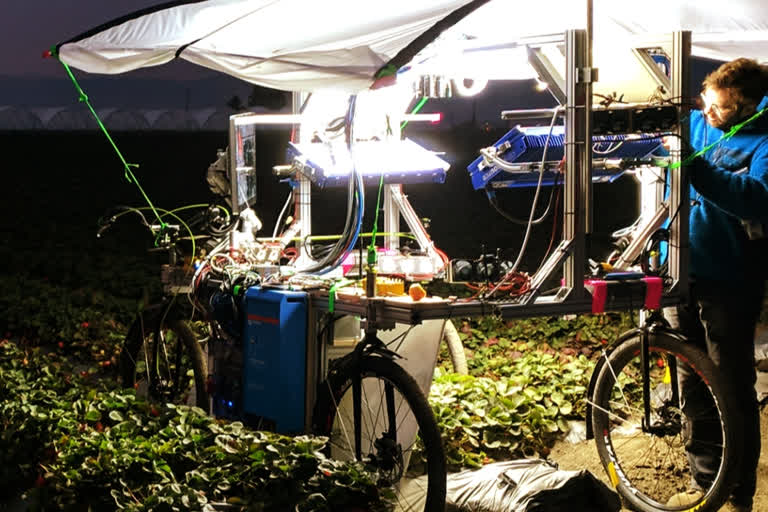Hyderabad: Internet giant Google Inc. has added another feather to its cap of innovations with 'Mineral': a computational agriculture project which promises to combine farming with computers. The aim is to use the latest technology in order to meet the growing food needs.
In a plush green agricultural field, an 'electric vehicle' is seen moving around. The vehicle, named 'Plant Buggy', runs on four wheels - two on each side of the row of crops. After one round of the buggy, all details pertaining to the crop, such as the specific details of the crop name, physical attributes of the plant, the length and breadth of the leaf, colour of the stem, fertility of the soil, and even weather conditions, are all recorded and displayed on a computer monitor.
The best part is that all the information related to the crop reaches the computer within a matter of seconds. The Plant Buggy was birthed to make possible such a seemingly impossible task.
The buggy described above, is actually a robot, a part of the 'Mineral' program initiated by the X-Factory scientists of Google's subsidiary - Alphabet Inc., which is famed for its latest and creative innovations. The Plant Buggy works in conjunction with GPS and can accurately detect the location of any plant in the entire field. With the help of advanced technology, it analyses the characteristics and the growth pattern of the crop with the help of advanced cameras and other equipment. Based on the outcomes, it deciphers various growth issues of the crop such as the onset of pests, the estimated time of harvest, growth of the crop, etc. It further advises various methodologies for a good yield.
"Achieving success at the rate of ten times is easier than achieving 10 per cent of success" - this is the theory of 'X: The Moonshot Factory'. The implication is that nothing is impossible if you abandon the old way of thinking and think anew. Despite all the mocking, the scientists here do not hesitate to ask strange questions. Their motivation is to see the world from a completely new and different perspective.
Read: Israel to extend tech to boost agriculture, IT in NE India
X Factory scientists believe that the innovation of such best equipment, even in the fields of agriculture can revolutionise the field. As part of this thought process, a variety of new devices were designed to focus on computer-assisted farming.
The foundation of the Mineral program is the determination to provide global food security. In order to meet the demand of the consistently increasing food needs for the next 50 years, it is necessary that the yield should be more than a cumulative yield of the last 10,000 years. It is pertinent that this higher yield is achieved in a situation where yields continue to fall due to various changes in the climate.
Currently, high yielding crops like paddy, wheat, and maize are being grown. The varieties of plants on earth that are edible are over 30,000. However, it is to be noted that only one per cent of these varieties is being harvested for food.
More than a dozen crops are cultivated identically. Depending on the area, pesticides, herbicides, and fertilisers are used. Achieving food security with such old methods is going to remain a dream itself. Going further there is every chance that the onset of pests is going to increase at a high rate as well as the nutrients in the soil may be depleted and the microbial diversity may also be damaged. As a result, fertilisers and chemicals are used indiscriminately and the soil is also damaged.
On the one hand, the above not only reduces yields but also lowers nutrient levels in foods. New equipment and technologies are needed to avoid such consequences. With this in mind, the Mineral program uses artificial intelligence, sensors, simulations, and robots. With the help of these, research is conducted to understand the growth of the plants, if they gel well with the atmosphere and circumstances. Further, it also helps scientists and farmers understand the individual developmental goals of each plant in the crop separately.
Read: Google to allow Meet users replace background with image
There is a specific reason behind naming the computer-aided farming project 'Mineral'. Minerals play a pivotal role in sustaining life on earth. They act as an invisible link between crops, plants, soil, food frame, and humans. Minerals such as zinc, iron, and magnesium are essential for our health. These minerals, which are deposited in sandstones, get released by bacteria and fungi. Ions of these minerals get dissolved in water are then absorbed by plants through the roots.
All this is a complex ecosystem. Hence, this innovative farming method was named 'Mineral' with the intention of reflecting such a complex process. The key is to create various tools and software that help us see and understand the plant world from a completely different perspective.



